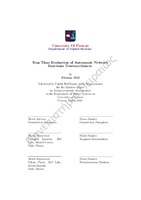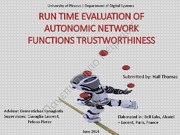| dc.contributor.advisor | Δεμέστιχας, Παναγιώτης | |
| dc.contributor.author | Χωλλ, Θωμάς | |
| dc.date.accessioned | 2015-05-04T09:05:33Z | |
| dc.date.available | 2015-05-04T09:05:33Z | |
| dc.date.issued | 2014-10-29 | |
| dc.identifier.uri | https://dione.lib.unipi.gr/xmlui/handle/unipi/6440 | |
| dc.format.extent | 60 | el |
| dc.language.iso | en | el |
| dc.publisher | Πανεπιστήμιο Πειραιώς | el |
| dc.rights | Αναφορά Δημιουργού-Μη Εμπορική Χρήση-Όχι Παράγωγα Έργα 4.0 Διεθνές | |
| dc.rights.uri | http://creativecommons.org/licenses/by-nc-nd/4.0/deed.el | |
| dc.subject | Ηλεκτρονικοί υπολογιστές -- Δίκτυα | el |
| dc.subject | Τηλεπικοινωνιακά συστήματα | el |
| dc.subject | Traffic engineering | el |
| dc.subject | Energy conservation | el |
| dc.title | Run time evaluation of autonomic network functions trustworthiness | el |
| dc.type | Master Thesis | el |
| europeana.isShownAt | https://dione.lib.unipi.gr/xmlui/handle/unipi/6440 | |
| dc.contributor.department | Σχολή Τεχνολογιών Πληροφορικής και Επικοινωνιών. Τμήμα Ψηφιακών Συστημάτων | el |
| dc.identifier.call | 625 ΧΩΛ | el |
| dc.description.abstractEN | Autonomic networking and self-management are promising concepts for operating large-scale complex networks. Stability, robustness, and security issues arising from future self-organizing networks (SONs) must be under stood today, in order to be incorporated into their design, standardization,and certi cation. The success is gaining ground in addressing the per-
ceived concerns of complexity and total cost of ownership of Information Technology (IT) systems. But we are now faced with a challenge springing from this very success. This challenge is trustworthiness and there are limited research results published in this direction. This, if not addressed will de nitely undermine the success of Autonomic Computing (AC). How do we validate a system to show that it is capable of achieving a desired result under expected range of contexts and environmental conditions and beyond? We address the issue of operator trust in Long Term Evolution (LTE) SON through the design and the implementation of veri cation and trust evaluation mechanism which is mandatory in order to avoid reluctance from them
to delegate important management tasks to some autonomic entities. This work introduces an online trust assessment framework for autonomic functions and proposes the relevant evaluation mechanisms. This approach addresses trust in terms of reliability and performance of the autonomic entities while it aims to be fully compliant with the Uni ed Management
Framework (UMF [12]). It attributes and continuously updates a trust index that characterizes the behaviour of an entity according to its experiences, thus providing useful information to the operator. We present a study ex-
ample, related to a SON load balancing autonomic function, to illustrate the methodology of our approach and provide implementation details. Besides, we demonstrate the feasibility and value of the proposed trust assessment
framework through a set of numerical evaluations. | el |
| dc.contributor.master | Τεχνοοικονομική Διοίκηση και Ασφάλεια Ψηφιακών Συστημάτων | el |




